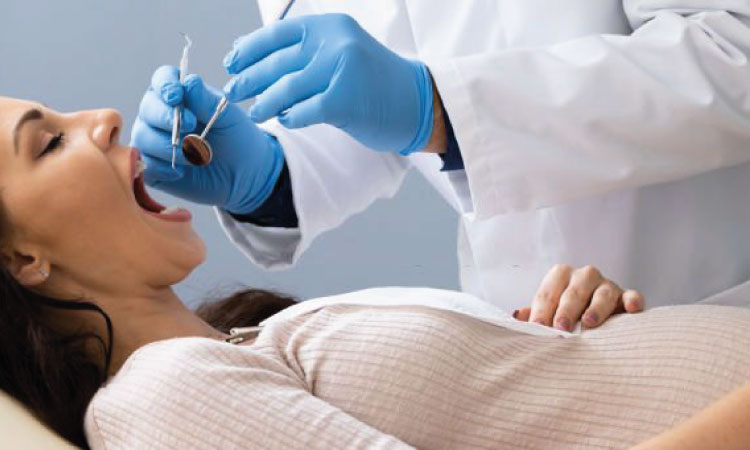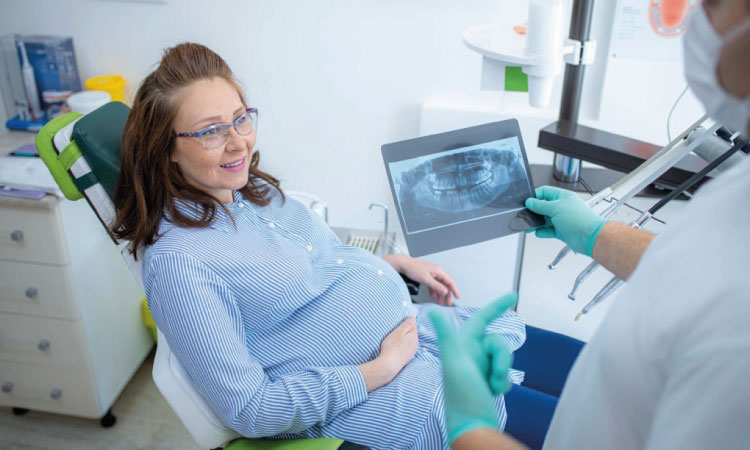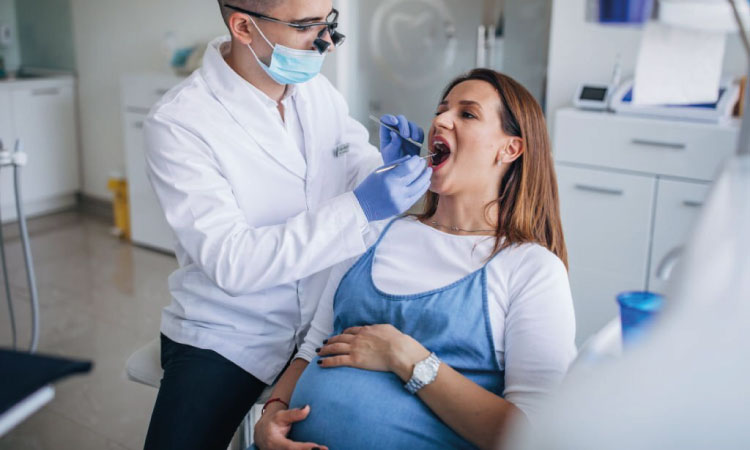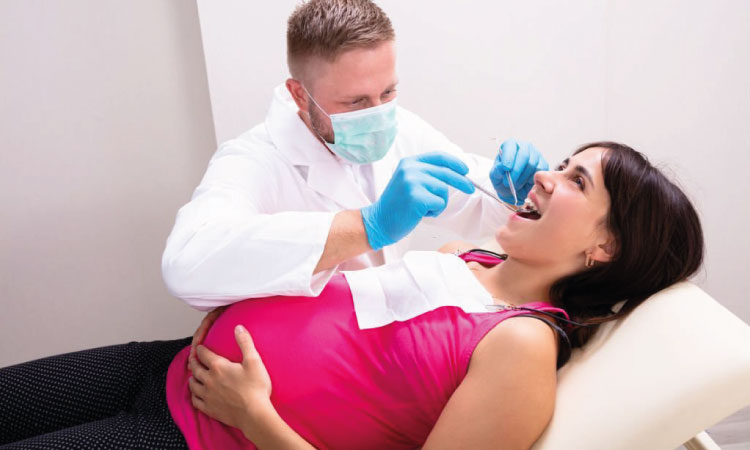So your friend recommends that you see a dentist when you tell her you are planning a baby. “What? Why? Can dental problems during pregnancy cause miscarriage?”This is probably what you feel. Well, as strange it may sound now, the truth is your friend is right.
The most important thing to do before trying to get pregnant is to make sure that your oral health is in good shape. When you’re expecting a child, your risk of developing oral health issues increases—and those issues can have a direct impact on your pregnancy. Seeing the dentist before trying to conceive is, therefore, something you should not put off. If you are a pregnant woman or are thinking about becoming pregnant and are concerned that you may have gum disease, you should visit your dentist as soon as possible.
The goal of this article is to educate readers about the value of prenatal dental care and treat oral health issues that may arise during pregnancy.
What Triggers Dental Issues During Pregnancy?
Pregnancy-related oral health issues can be caused by any of the following:
- Cravings for sweets
- Issues with the gums
- Constant vomiting, which may erode tooth enamel
- Gagging while brushing teeth that prevents proper cleaning of teeth
Related Reading: 18 Foods That Can Cause Miscarriage In Early Pregnancy
Common Gum Problems During Pregnancy
The rise in reproductive hormones during pregnancy has been linked to an increased risk of gum disease in some women.
Calculate Due Date With Conception Date
Some common gum issues experienced by pregnant women are:
- Gingivitis, a gum infection that more often happens during the second trimester of pregnancy. Gingivitis affects 60 to 75% of pregnant women1
- Periodontal disease, an infection of the gums, ligaments, and bone that hold the teeth in place. Untreated gingivitis causes it, and it can lead to tooth loss. It is believed that periodontal disease affects the maternal and fetal immune systems, resulting in premature labor2
- The pregnancy epulis, a benign tumor that cannot develop into cancer. It manifests as a red, round, bleed-prone growth on the gum. After giving birth, the epulis usually shrinks or disappears on its own
If you’ve been experiencing gum problems while pregnant, it’s crucial to see a dentist before giving birth. While pregnancy hormone-related gum issues typically clear up after delivery, a small percentage of women do experience more advanced stages of gum disease that will necessitate treatment.
Can Gum Disease(s) Cause Miscarriage?
No scientific evidence shows that slightly swollen or red gums will harm your unborn child or cause a miscarriage or premature delivery. However, gum disease progresses through gingivitis, periodontitis, and advanced periodontitis.
If it progress to progress advanced periodontitis, it can cause premature birth and low birth weight in babies. If left untreated, the germs that affect the gum tissue reaches the bloodstream and then travels to the womb. This may increase the chances of miscarriage.
Can Dental Problems Cause Miscarriages?

Oral health is an important part of prenatal care because poor oral health during pregnancy can harm an unborn baby. There are some common causes of miscarriage you should be aware of
Untreated tooth infection while pregnant may lead to miscarriage. Let’s examine the link between dental issues and miscarriage.
Based on two hypotheses, poor oral health is linked to adverse pregnancy outcomes.
According to the first hypothesis, pregnancy-related complications may arise from periodontal disease because of the abnormal immunological changes it causes. For example, moderate to severe periodontal disease has been linked to increased levels of inflammatory cytokine production.
Bacteria and/or their pathogenic factors, along with the inflammatory cytokines, may eventually reach the placenta if the immune response is not effective at keeping the infection localized. There is a possibility that this may result in a preterm miscarriage or preterm delivery due to premature rupture of membranes and contractions of the uterus3.
The second theory proposes that bacteria in the mouth invade the placenta directly, leading to inflammation and perhaps premature birth. Animal models of chronic and acute infections have shown that oral bacteria can translocate into the placenta4.
Can A Tooth Infection Cause Miscarriage?
Infections of the teeth can cause the body to release pro-inflammatory mediators, which have been linked to an increased risk of miscarriage. There is mounting evidence that bacteria in the mouth can travel through the bloodstream and inflame the uterus directly. Various forms of tooth infections have been linked with adverse pregnancy outcomes, including stillbirth, miscarriage, intrauterine growth retardation, and preeclampsia beyond periodontitis and preterm birth5.
Related Reading: 12 Early Pregnancy Tips To Avoid Miscarriage
Can I Get A Root Canal During Pregnancy?
If your dentist recommends a root canal treatment, it indicates that you require immediate dental care. Further delays in receiving treatment can lead to the aforementioned complications. It is safe to receive a root canal during pregnancy.
Local anesthesia, x rays and antibiotics are three main concerns of the mothers when it comes to rootcanal during pregnancy.During pregnancy, mothers have legitimate concerns about receiving local anesthetic, undergoing x-rays, and taking antibiotics for root canal treatment.
Local anesthetics are relatively safe during pregnancy when administered properly and in the correct dosage5.
X-rays are necessary for evaluating the condition of the tooth’s roots during root canal treatment, the rays will only hit your jaw and not your stomach.
According to our panel gynaecologist Dr Ankita Patel Tayal, you must always tell your dentist if you are pregnant, especially if there is a chance that you will need an x-ray. X-rays during pregnancy do not carry risks to your unborn baby, such as miscarriage or birth defects but repeated exposure to radiation can potentially damage the body’s cells in the long run, increasing risk of developing cancer.
Antibiotics may be prescribed to pregnant women after dental procedures, but dentists typically only do so if it’s absolutely necessary. Furthermore, if the dentist prescribes antibiotics, only medications that are safe for both mother and child will be given.
While a root canal can be done at any point in pregnancy, the second trimester is the safest. As the developing baby is most susceptible to harm during the first trimester, women are advised to put off getting a root canal until the second trimester. Additionally, the overactive gag reflex brought on by morning sickness and nausea during this time makes the procedure more challenging.
Third-trimester pregnancy can make it difficult to sit through a full dental appointment. Therefore, if a dentist discovers the need for a root canal in the eighth month of pregnancy, he or she will likely provide a temporary solution and attempt to schedule the procedure after the birth of the baby.
Can I Treat A Cavity During Pregnancy?
Cravings, hormonal changes, and increased sensitivity in teeth and gums during pregnancy all contribute to an increased risk of cavities in pregnant women. A pregnant woman should get a rotten tooth treated as soon as possible.
Concern about getting dental fillings while one is pregnant is normal and understandable. But you can get your cavities fixed at any time during pregnancy without worrying about your baby6. Scheduling fillings during the second trimester is ideal, as nausea will be less likely to occur.
Mercury is present in the dental amalgams used for “silver fillings,” which can pose a small risk to the developing fetus. If you are pregnant and need a filling, talk to your dentist about your pregnancy so that the doctor can find an alternative to amalgam. If he understands that you are pregnant, he may recommend a temporary filling or a different amalgam.
Related Reading: 9 Common Infections During Pregnancy You Should Be Aware Of
Is Dental Cleaning Safe During Pregnancy?
Routine dental checkups and cleanings are safe to get at any stage of your pregnancy. You can also have any urgent dental procedure that necessitates local anesthesia during pregnancy. But it’s best to wait until after the baby is born to get cosmetic dental work done, like a deep cleaning or whitening.
Is It Safe to Get Dental X-Rays While I’m Pregnant?

Yes. X-rays are a type of medical imaging test in which radiation is used to create a picture on film. Diagnostic dental radiographs can reveal hidden issues in the teeth, gums, and jaw. Too much exposure to radiation can harm your health. However, dental x-rays during pregnancy are safe. In comparison to older models, modern dental x-ray machines produce significantly less radiation7.
Radiation exposure to the abdomen and neck can be reduced by wearing protective gear like lead aprons and collars, which dentists do during x-rays. However, if your dentist wants to take an X-ray of your teeth, make sure she is aware that you are pregnant or trying to conceive before she does so.
What Steps Can You Take to Reduce Your Risk of Developing Dental Problems While You’re Pregnant?
Dr Ankita Patel Tayal, practising obstetrician for more than 10 years, says that there have been proven links between gum disease and adverse pregnancy outcomes, with a greater risk of pre-eclampsia, premature birth and of giving birth to an underweight child. It is therefore vital that pregnant women do not ignore any early signs of gum disease and get checked out by a dental professional straight away.
As tooth infection affects pregnancy, it is important to take some steps to avoid it. Here are a few things that can be done to help reduce the likelihood of developing dental problems during pregnancy.
1. Make sure you brush your teeth
Certain pregnant women experience nausea or vomiting when brushing their teeth, especially the back teeth. However, dental cleaning during pregnancy is important. If you want to keep your teeth healthy and strong, you must brush them carefully.
The following are some tips to help prevent gagging while brushing:
- Use a small, soft-headed toothbrush, like one made for toddlers
- Brush carefully and slowly
- Choose a different brand of toothpaste if the present one makes you gag. Alternatively, you can brush your teeth with water and then use a fluoride-containing mouthwash
2. Try to minimize tooth damage from vomiting
Pregnancy hormones soften the lower esophageal sphincter. This triggers gastric reflux. Thus, strong stomach acids can coat your teeth as you vomit from morning sickness. Tooth enamel can be worn down by constant acid reflux and vomiting, which can lead to cavities.
So try these suggestions if you’re experiencing vomiting.
- Don’t brush your teeth for at least an hour after throwing up. Brushing teeth covered in stomach acid may scratch tooth enamel
- Rather than brushing, after vomiting, rinse with tap water
- Then, rinse your mouth out with a fluoride-based mouthwash
- In the absence of fluoridated mouthwash, fluoride-containing toothpaste applied with a finger is an acceptable substitute. Then, rinse thoroughly with water
3. Be aware of your sugar craving
Pregnancy can cause unusual cravings for sugar in some women. If you want to keep your teeth healthy and reduce your risk of tooth decay, you should stay away from these foods. Replace high-sugar snacks with those that are lower in added sugar.
If you have a sweet tooth that nothing else can satisfy, try fresh fruit instead of a less healthy option. After indulging in sugary foods, it is important to either brush your teeth or rinse with a fluoride-containing mouthwash.
4. Incorporate more calcium into your diet
In order to meet the demands of your growing baby and maintain your own bone and tooth health, you will need to consume more calcium than usual during pregnancy.
Related Reading: Top 10 Calcium Rich Foods For Pregnancy
5. Increase your vitamin D during pregnancy
Incorporating vitamin D into your diet will aid in your body’s ability to absorb calcium. In order to maintain healthy levels of vitamin D, even brief sun exposure is helpful. However, you should take precautions to avoid getting a sunburn. Include foods that are high in vitamin D, such as fatty fish like salmon and mackerel, vitamin D fortified milk, and other such foods.
Conclusion
Dental hygiene should be a top priority during pregnancy. Oral health issues should be addressed with the appropriate care during pregnancy. Women and the health care providers who care for them, including dentists, need more information and clarification regarding the safety of dental treatments that can be performed during pregnancy. Pregnancy doesn’t pose any risks to the mother or the unborn child when dental care is administered, and pregnant patients can be treated according to specific guidelines.



